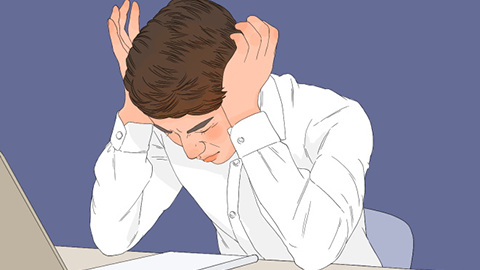What could be the possible causes of a feeling of pressure or fullness in the right side of the head?
Generally, a feeling of fullness or distension on the right side of the head may be caused by tension-type headaches, migraines, hypertension, cervical spondylosis, sinusitis, or other conditions. If symptoms occur frequently or persistently worsen, it is advisable to promptly visit a reputable hospital for examination and diagnosis. Detailed explanations are as follows:
1. Tension-Type Headache
Long-term mental stress, anxiety, or insufficient sleep can cause continuous contraction of the head muscles, resulting in a sensation of distension on the right side of the head, often accompanied by a tight, band-like feeling around the head. In daily life, it is important to regulate one's schedule and ensure 7-8 hours of sleep per day. Avoid prolonged desk work and get up to move for 5-10 minutes every hour. Applying heat compresses to the right side of the head can help relieve muscle tension. Medications such as acetaminophen tablets, ibuprofen sustained-release capsules, or naproxen sodium tablets may also be used under a doctor's guidance to alleviate the pain and discomfort.

2. Migraine
Genetic factors, dietary triggers, or environmental stimuli may induce migraines, which typically present as a feeling of distension on one side of the head, often accompanied by pulsating pain. Avoid known triggers and maintain a light diet. During an attack, rest in a quiet environment and take medications such as sumatriptan succinate tablets, zolmitriptan tablets, or naproxen sodium sustained-release tablets under medical supervision to relieve symptoms.
3. Hypertension
A sudden increase in blood pressure raises the pressure within the cerebral blood vessels, which may cause distension on the right side of the head, sometimes accompanied by dizziness and palpitations. Regular blood pressure monitoring is essential, and antihypertensive medications such as amlodipine besylate tablets, nifedipine controlled-release tablets, or valsartan capsules should be taken according to medical instructions. In daily life, reduce high-salt foods, control salt intake, and avoid significant emotional fluctuations.
4. Cervical Spondylosis
Prolonged use of mobile phones or computers while maintaining a bent-neck posture can lead to cervical disc herniation, compressing the right nerve roots or vertebral artery and affecting cerebral blood supply, which may cause distension on the right side of the head, often accompanied by neck and shoulder pain. Adjust sitting posture to maintain the natural cervical lordosis. Use a stand to elevate the screen during work to reduce the time spent with the head bent forward. Under medical guidance, cervical traction may be performed, and medications such as mecobalamin tablets, vitamin B1 tablets, or celecoxib capsules may be used to nourish nerves and reduce inflammation. If nerve compression is severe, surgical removal of the herniated disc material (discectomy) may be necessary to relieve the pressure.
5. Sinusitis
Inflammation caused by bacterial infection of the nasal mucosa can lead to fluid accumulation in the right maxillary or frontal sinuses, causing a feeling of distension on the right side of the head, often accompanied by thick nasal discharge and nasal congestion. Under medical supervision, medications such as amoxicillin-clavulanate potassium tablets, cefuroxime axetil tablets, or mometasone furoate nasal spray may be used to control infection and reduce mucosal swelling. In daily life, nasal irrigation with normal saline can help maintain sinus patency. If medication proves ineffective, procedures such as sinus puncture and irrigation or nasal endoscopic surgery may be performed to clear accumulated pus from the sinuses.
In daily life, maintain a regular routine and avoid staying up late. Reduce intake of high-sugar and high-fat foods and consume more fresh fruits and vegetables. Engage in moderate aerobic exercise, such as brisk walking or jogging, to improve cerebral blood circulation. Maintain emotional stability, avoid excessive stress and anxiety, and regularly monitor blood pressure and cervical spine health. Seek medical attention promptly if discomfort occurs.




